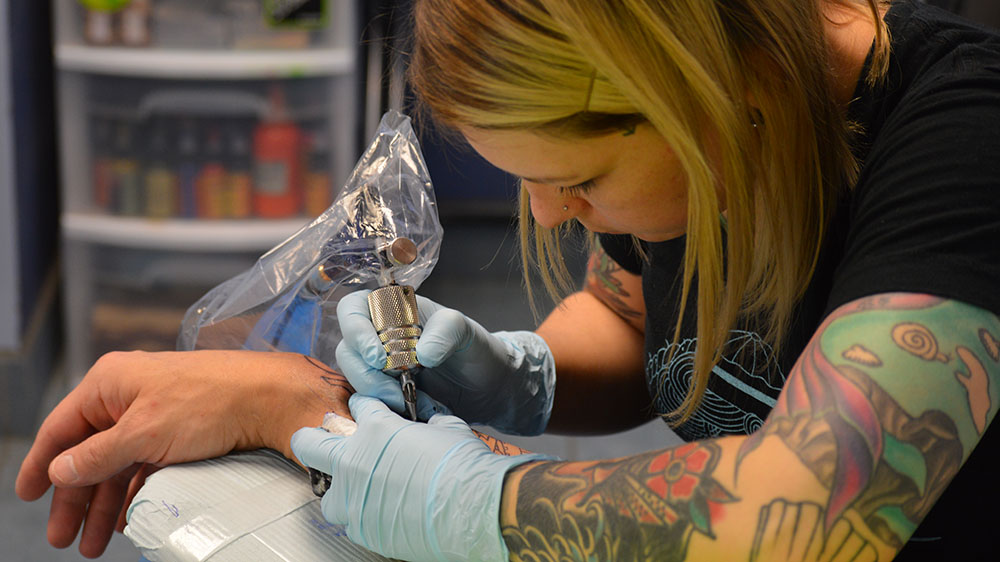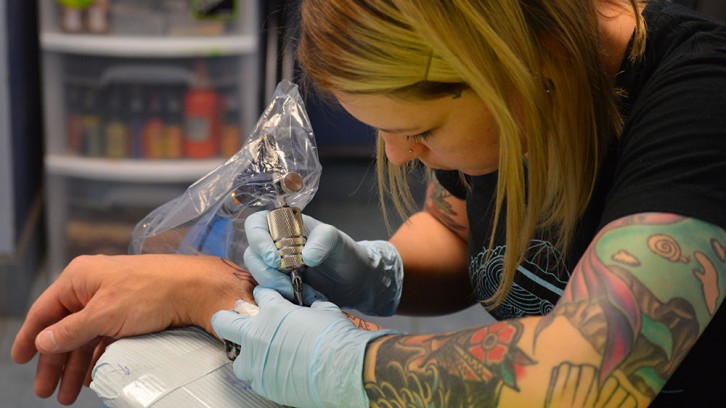TATTOO REGULATIONS
Nova Scotia tattoo legislation to take effect 5 years after it was passed
A manager with Sin on Skin Tattoo Studio says the tattoo industry badly needs regulations

caption
Tattoo artist Lacey Cormier creates a Polynesian pattern on Erik Wintner's right arm.
caption
Tattoo artist Lacey Cormier creates a Polynesian pattern on Erik Wintner’s right arm.A four-year-old piece of legislation may change where you can get tattooed in Nova Scotia.
The Safe Body Art Act (SBAA), which passed in 2011, was created with the goal of protecting Nova Scotians from disease when they get tattoos or piercings.
The act would require shops offering body art to meet standards for infection and disease control.
But in the years since the bill passed, no regulations have materialized.
Nicole Nickerson, office manager for Sin on Skin Tattoo Studio in Halifax, said it’s been frustrating to watch the government take so long to bring rules into effect.
She’s worked with Sin on Skin owner, Kyle LeBlanc, for 25 years and she said changes within the industry mean regulations are desperately needed.
“When I met [LeBlanc] there were four tattoo studios. If you go through the phonebook now there are well over hundreds,” Nickerson said. “There was just this blow up of tattoo studios.”
A search of Yellowpages.ca says there are currently 23 tattoo studios in HRM.
A customer’s perspective
Kristie Delange just had her fifth tattoo inked onto her skin – an image of the TARDIS from Dr. Who on her thigh. It cost her $500 and she got it at Sin on Skin.

caption
Kristie Delange recently got her fifth tattoo, an image of the TARDIS from Dr. WhoDelange said while she wasn’t aware the tattoo industry in Nova Scotia was unregulated, both of the tattoos she received in the province have turned out well, especially her latest piece.
“I do watch them. They do clean their area, every needle is brand new packaging, and they open it up to show me,” she said. “I can’t complain. It seems well regulated from what I can see.”
Nickerson said the amount of new artists flooding the market with offers of cheap tattoos should make everyone, especially customers, concerned.
“What we have here now is people [who are] half-trained training new people, so they are getting even worse training,” she said. “Then they are opening new studios giving even worse training and it’s just a trickling effect.”
The four-year delay
As of Nov. 26, 2015 a post on the Nova Scotia government’s Health and Wellness website states regulations are “expected in the fall of 2015.”

caption
A post on the Nova Scotia government’s Health and Wellness website says that the regulations will be introduced in 2015.Carrie Fraser, a program officer for Nova Scotia’s Department of Environment, said regulations for SBAA will be introduced sometime next year.
She said the reason regulations have taken so long to develop is there has never been a system like this in Nova Scotia.
“It’s not like you had an existing program already that you were massaging,” she said. “You’re starting from nothing.”
Fraser said the details on the regulations are still being finalized but inspection will be a component of the process.
“How many times a year an inspection will be required, that has to be determined,” Fraser said. “But the first thing is establishing where all the facilities are located and then we’ll understand what we have to work with.”
Nickerson said the government has consulted with their studio to try and find out what they would want, but that was about a year ago. Since then, they haven’t heard anything from the government.
“We were told that they would be in contact when something was a little more concrete and closer to fruition,” she said.
About the author

Alexander Quon
Alexander Quon is a freelance journalist from Saskatchewan with an interest in political reporting and data journalism. He's currently working...
